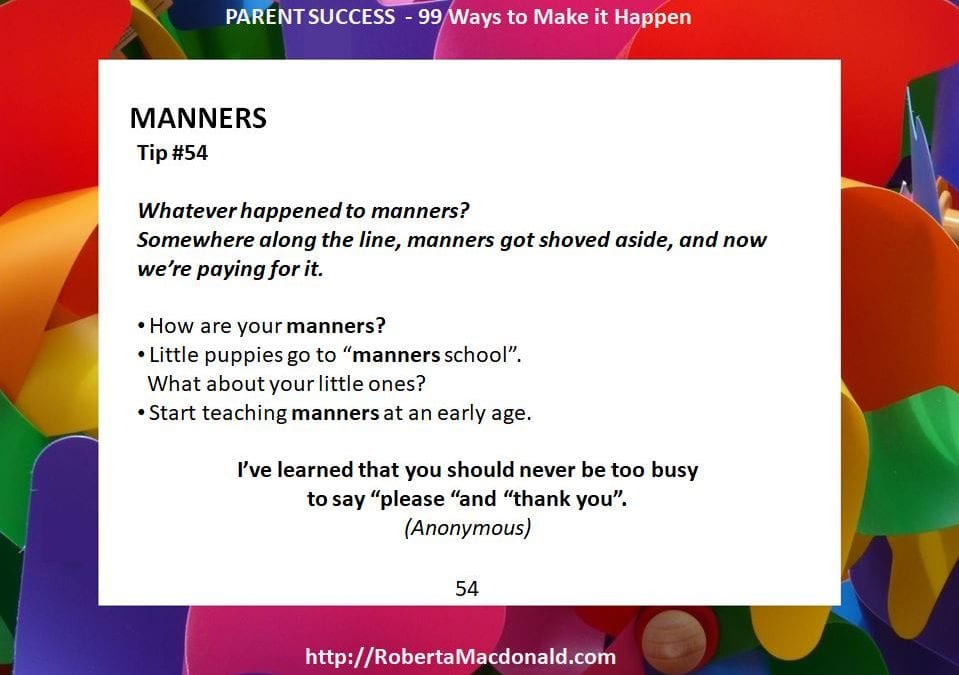
Parent Tips – Manners
5 Parenting Tips on Manners
Let’s Bring Manners Back!
Whatever happened to manners?
Somewhere along the line, manners got shoved aside, and now we’re paying for it.
Depending on the age of your child, instilling manners may be easier said than done. For young children, they easily learn by example. For older children they may already have a few “bad habits”. I will take a different motivation to have them implement a change in their behavior.
Take a look at these five parenting tips on manners and notice if there are any changes you can make in your life and theirs to bring manners back!
- Manners used to be important…what happened?
- Anyone can act in a disrespectful way
- Many children, teens, and adults were never modeled manners
- Often disrespect was part of their upbringing
- It is such a loving gift to teach manners, which is love and respect
- Why are manners important to teach?
- Manners show that each person, no matter their age, is important
- When manners are not learned, all relationships are affected.
- When manners are not learned, misunderstanding happens.
- Unhappy and dysfunctional relationships are the results of not learning manners.
- Lack of manners can create wars.
- Manners = Respect
- Little puppies go to “manners school”. Why shouldn’t little kids go to “manners school”?
- When a child has not been taught how to be appropriate in life, it is similar to a young dog who, in his exuberance for his new life, behaves badly. The puppy is not bad, but training is necessary for both.
- An untrained puppy, as well as an untrained child, can be a real nuisance
- It is unfortunate if parents are not aware of the importance of early training. The child is being cheated of good training.
- How early should parents begin teaching manners?
- Model good manners at the birth of your first child and continue being a good model.
- Showing respect will teach respect.
- You cannot fool a child as he or she knows when an adult is showing respect, or not, as they can feel, see and hear the difference.
- Can we be too busy or indifferent to say “please” and “thank you”?
- Be consistent in being a good role model to your children.
- Teach your young children to respond with “please” and “thank you”.
- Your child will thank you later as it is a positive habit that will serve then well as an adult.
- When a child is resentful and does not show respect and thanks when a gift is given, the gift should be denied.
- A child who acts with disrespect may not fully understand the consequences of his or her behavior.
- The child will learn later in life that his or her behavior has unhappy consequences.
- It is a delight to be around a child (and a puppy) with good manners.
Activity:
Choose several of these tips to focus on this week. Consider journaling your thoughts and feelings. Let me know how you are doing as you implement the changes.
I will be hosting an on-line parenting course in the near future. To make sure you don’t miss it – Sign up to receive my email updates. Contact Me
As always, email me with any questions. Roberta@RobertaMacdonald.com
To Your Parenting Success
Roberta
Class:
Calming Down – A Daily Life Management Course
This course is a guided group discussion on how to gain a better understanding of the causes of anger and how to develop a less reactive, stressful way of life.
My Book: Parent Success: 99 Ways to Make It Happen, was written and used in many parent classes in the greater Seattle area for over 30 years. Roberta wrote the Parent Success book so that parents who are burdened with many parenting challenges and unexpected stressors will have a simple daily guide.
Get your copy through Amazon by clicking this link Parent Success: 99 Ways to Make It Happen
